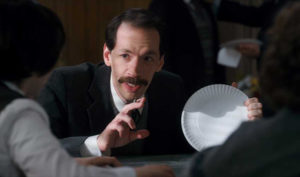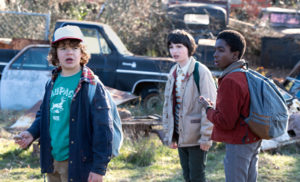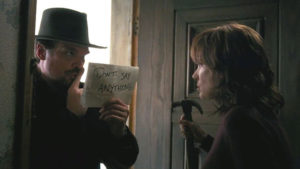 What does it take to clarify the central conceit of a science fiction series?
What does it take to clarify the central conceit of a science fiction series?
When a humble science teacher, Mr. Clarke, uses a paper plate to explain the “theoretical” existence of other dimensions.
The Acrobat is walking a tightrope and can only move in one dimension of space: backwards/forwards. Gravity does not allow him to move in any other way without plummeting to his death. However, on the tightrope is another entity: the flea.
The Flea can move in two dimensions: backwards/forwards AND to one side of the rope or the other. Here is the catch; this “second dimension” is a smaller, “closed” loop. The flea starts moving to the side of the rope and eventually ends up on the “upside down” of the tightrope. If it continues its journey, it then ends up right back where it started.
So our boy wonders ask Mr. Clarke (Arthur C. Clarke anyone??), how does the acrobat not only become aware of this smaller, closed dimension, but also enter into that dimension? Mr. Clarke folds the plate in half and stabs the half circle with a pen. Create a portal, a rip in time and space.
This is all theoretical after all. Carry on.
If the acrobat were to enter into the closed dimension of the flea, it would mean that reality would have to bend. Things like gravity would have to be refracted to allow the acrobat to experience the very thing he cannot: the upside down of the tightrope. But, it seems like the immediate question of Stranger Things is what happens when the acrobat meets the flea in the upside down? Since the rip in time and space does exist, how will it then bend the realities of Hawkins, Indiana?
 By the end of the episode Nancy comes face to face with the flea, aka the monster (“the man without a face”), as it devours a deer it reaped from Nancy’s dimension. Dustin recognizes all of the compasses are now pointing to a new true North. Eleven knows the danger of this new North and bends the compasses in a new direction, soon to be realized by Lucas who confronts Mike about just how untrustworthy Eleven really is. Sheriff Hopper gets caught in the Department of Energy and is drugged and bugged because he is getting too close to the truth of what Dr. Brenner is up to in government building on the outskirts of town.
By the end of the episode Nancy comes face to face with the flea, aka the monster (“the man without a face”), as it devours a deer it reaped from Nancy’s dimension. Dustin recognizes all of the compasses are now pointing to a new true North. Eleven knows the danger of this new North and bends the compasses in a new direction, soon to be realized by Lucas who confronts Mike about just how untrustworthy Eleven really is. Sheriff Hopper gets caught in the Department of Energy and is drugged and bugged because he is getting too close to the truth of what Dr. Brenner is up to in government building on the outskirts of town.
The cost of this rip in dimensions is a loss of stability wholesale. Nothing and no one can be trusted. Paradigms have been bent much like the gravitational fields of Hawkins. In almost a reverse of Susan in The Chronicles of Narnia, Nancy moves from an existence of boys and high school drama to one where the invisible is made visible thus making her prior concerns barely worth consideration.
Jim Hopper collides into the truth that Joyce has always held faithfully to: Will is alive and some entity wants to keep his existence a secret and keep tabs on those who are wise to their ploy. His reality, too, becomes unstable as he finds himself believing the “crazy lady” instead of the authorities that represent the “reality” that we find to be most reasonable.
Lucas questions Eleven and is indeed correct to question her since she was using her telekinetic powers to thwart their search for Will. Even if she was doing it for their safety, she was bending the truth, something that throws off the stability of the relationships of our boy wonders. A rift is torn open between Mike and Lucas because of this disruption.
Mr. Clarke rightly states, “Science is neat, but I’m afraid it’s not very forgiving.” It’s easy to conceive of the theoretical ways in which such an event would change the fabric of our known world. What Stranger Things succeeds in doing, however, is showing the less clear ways in which such an event would rip apart of the fabric of human relationships. We aren’t meant to live in the world of a new True North. We aren’t meant to experience the fourth dimension of the “upside down.” For in that dimension, the means of grace may look less gracious. In the words of the recent Dinosaur Jr. song, “Love Is…,” “here comes the age where forgiveness is a sin.”
 This is the episode where the world of the Upside Down begins to leak into the reality of Hawkins, throwing everything off into increasing chaos. Not only is the physical world bent, but so is the geography of the human heart. It is a brave new world. Will the residents of Hawkins be able to return to normalcy or will the incarnation of the theoretical forever refract reality.
This is the episode where the world of the Upside Down begins to leak into the reality of Hawkins, throwing everything off into increasing chaos. Not only is the physical world bent, but so is the geography of the human heart. It is a brave new world. Will the residents of Hawkins be able to return to normalcy or will the incarnation of the theoretical forever refract reality.
It is theoretical after all. Isn’t it?


